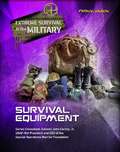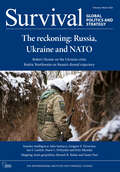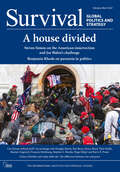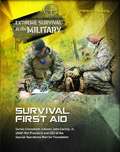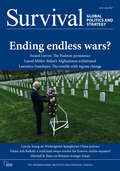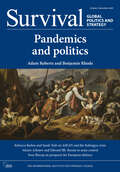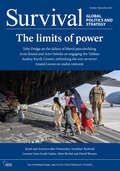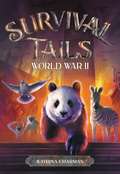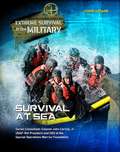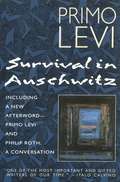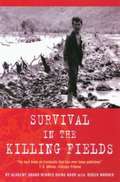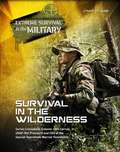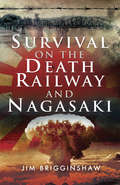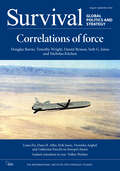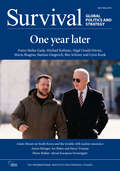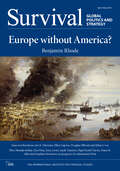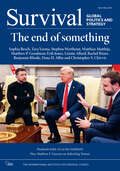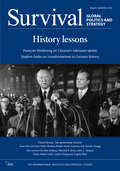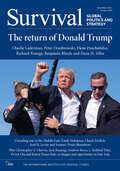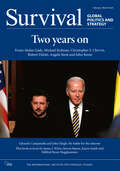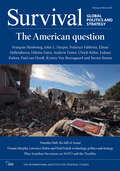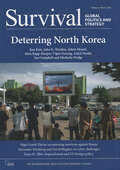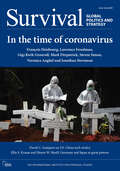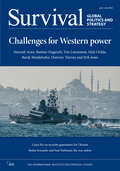- Table View
- List View
Survival Equipment
by Patrick WilsonBeing in the Special Forces means you will be taken all over the world for some of the most difficult missions, often to unfriendly places and dangerous regions. Elite soldiers must be trained to survive anywhere, whether in the endless deserts of Africa or the freezing tundra of the Arctic. Soldiers need to know how to survive for weeks or even months at a time. They must also know how to survive with as few supplies as possible; after all, in the wilderness, you can't drop by the store to resupply! Find out what equipment elite soldiers need to have with them to survive. Discover how to improvise equipment using only the natural resources around you. Learn: * what clothing to wear in hot and cold climates. * what equipment to carry. * what a survival tin is and what's inside it. * how to make your own tools and clothing. * how to survive hostile terrains.
Survival February - March 2022: The Reckoning: Russia, Ukraine and NATO
by The International Institute for Strategic StudiesSurvival, the IISS’s bimonthly journal, challenges conventional wisdom and brings fresh, often controversial, perspectives on strategic issues of the moment.In this issue:· The Ukraine crisis: Robert Hunter argues that the most important requirement of successful US-led negotiations with Russia is that Moscow demonstrate that it is prepared to be a responsible international actor· Erin Sikorsky contends that climate change should have a larger role in the day-to-day national-security agendas of the United States and other countries· Stephan Frühling and Andrew O’Neil warn that current US debates about no first use tend to underplay the broader alliance implications of any shift in US nuclear policy· Rahul Roy-Chaudhury and Kate Sullivan de Estrada assess that, given the 2021 US FONOP targeting India, Washington and New Delhi need to better manage their diverse positions on global governance, especially in the maritime domain· Nien-chung Chang-Liao warns that pragmatism in Chinese foreign policy is waning and considers why Chinese diplomats have become so aggressiveAnd nine more thought-provoking pieces, as well as our regular Book Reviews and Noteworthy column.Editor: Dr Dana AllinManaging Editor: Jonathan StevensonAssociate Editor: Carolyn WestAssistant Editor: Jessica Watson
Survival February–March 2021: A House Divided
by The International Institute for Strategic StudiesSurvival, the IISS’s bimonthly journal, challenges conventional wisdom and brings fresh, often controversial, perspectives on strategic issues of the moment.In this issue:Steven Simon argues that despite the violent storming of the US Capitol, Republicans are inclined to commit to minority ruleIn a special forum, IISS researchers and three other experts consider whether NATO’s European members can defend themselves without US supportHanns W. Maull contends that the coronavirus pandemic has revealed deficiencies of global governance, and analyses their implications for the future of international orderChristopher W. Hughes, Alessio Patalano and Robert Ward examine Japan’s grand strategy and Abe Shinzo’s legacy And seven more thought-provoking pieces, as well as our regular Book Reviews and Noteworthy column.Editor: Dr Dana AllinManaging Editor: Jonathan StevensonAssociate Editor: Carolyn WestAssistant Editor: Jessica Watson
Survival First Aid
by Patrick WilsonElite soldiers often operate in hard-to-reach locations or far behind enemy lines. If one of them is injured, medical attention is rarely readily available. For this reason, soldiers must be trained to treat injuries themselves. This book will show you how to treat some of the most common injuries and illnesses that you're likely to get in the wilderness. Whether it's a small problem like a blister or a major health concern like a heart attack, it's important to know how to deal with any injury or medical problem. Learn how to: * treat someone who has eaten a poisonous plant. * set broken legs after a climbing fall. * deal with hypothermia, when the body's temperature drops dangerously low. * provide treatment for severe burns. * stop a person from bleeding to death.
Survival June-July 2021: Ending Endless Wars?
by The International Institute for Strategic StudiesSurvival, the IISS’s bimonthly journal, challenges conventional wisdom and brings fresh, often controversial, perspectives on strategic issues of the moment.In this issue:Anatol Lieven argues that the Taliban will remain the most powerful military and political force among the Pashtuns of AfghanistanLanxin Xiang contends that, following what he describes as Donald Trump’s racist China policy, the Biden administration must avoid casting China as an alien threatDani Filc and Sharon Pardo assess that right-wing populists in Israel and Europe have become ideological allies, harnessing ethnic nationalism against global IslamAlex J. Bellamy and Charles T. Hunt analyse the intricacies of the use of force to protect civilians in UN peacekeeping missions And seven more thought-provoking pieces, as well as our regular Book Reviews and Noteworthy column.Editor: Dr Dana AllinManaging Editor: Jonathan StevensonAssociate Editor: Carolyn WestAssistant Editor: Jessica Watson
Survival October-November 2020: Pandemics and politics
by Adam Roberts Benjamin RhodeSurvival, the IISS’s bimonthly journal, challenges conventional wisdom and brings fresh, often controversial, perspectives on strategic issues of the moment.In this issue:Adam Roberts explores pandemics and politics through the ages, arguing that trust in leadership is essential in the struggle against infectious diseasesRebecca Barber and Sarah Teitt contend that ASEAN should take a more activist approach to the Rohingya crisis to salvage its credibilityGreg Austin assesses the strategic implications of China’s weak cyber defencesØystein Tunsjø casts doubt on the prospect of the Arctic becoming a theatre of great-power conflictAnd eight more thought-provoking pieces, as well as our regular book reviews and Noteworthy column.
Survival October-November 2021: The Limits of Power
by The International Institute for Strategic StudiesSurvival, the IISS’s bimonthly journal, challenges conventional wisdom and brings fresh, often controversial, perspectives on strategic issues of the moment.In this issue:· Anatol Lieven argues that realist support for prudence and restraint in foreign policy does not equate to chauvinism, isolationism and opposition to international cooperation· Toby Dodge assesses that the United States’ attempt to comprehensively transform Afghanistan was based on its erroneous presumption that the liberal-peacebuilding model was universally applicable· Audrey Kurth Cronin contends that the logic of fighting terrorists far from the US homeland no longer holds, as the US faces resource constraints and rising domestic terrorism· Jens Ringsmose and Sten Rynning analyse the potential priorities and scope of NATO’s next Strategic Concept, and how it can bridge the Alliance’s political–military divideAnd eight more thought-provoking pieces, as well as our regular Book Reviews and Noteworthy column.Editor: Dr Dana AllinManaging Editor: Jonathan StevensonAssociate Editor: Carolyn WestAssistant Editor: Jessica Watson
Survival Tails: World War II (Survival Tails #3)
by Katrina CharmanA brave messenger pigeon enlists a group of heroic zoo animals to help him complete his mission in this thrilling, informative read, perfect for fans of the Ranger in Time and I Survived seriesWorld War II is raging across Europe and the German army has their sights set on England. Messenger pigeon Francis carries important notes back and forth between England and her allies, and wants nothing more than to do his part for the war effort. But when Francis is injured on an assignment to deliver the most important message of the war--one which warns of a coming attack on Britain itself--he finds himself stranded in the middle of the London Zoo with no way to complete his mission.Ming, the world-famous panda, has so far managed to avoid being caught up in the war. But that's getting harder and harder to do as the zoo suffers under dwindling food rations and German air raids threaten the city every night. When Francis lands in Ming's enclosure, she knows she can no longer stand by and do nothing. Enlisting the help of a kind zookeeper and a resourceful troop of monkeys, Ming fights to help Francis recover his strength so that he can carry out his mission.But when the war finally arrives in London, threatening everyone in the zoo, Francis, Ming, and the other animals must work together to save themselves...and maybe even London itself.
Survival at Sea
by Chris McnabElite soldiers must know how to survive in every environment, including if they're stranded on the harshest ocean. Special Forces units trained to survive at sea are some of the most knowledgeable people in the world when it comes to a survival situation in the ocean. In this book, you will learn some of the techniques these soldiers use to stay alive at sea. You can learn from their training and discover: * what to do when a shark attacks. * how to tell when a storm is coming. * how to swim so that you save energy. * how to signal for help in the middle of the ocean. * how to treat a jellyfish sting. * how to build a raft out of logs or saplings.
Survival in Auschwitz
by Primo LeviLevi's classic account of his ten months in the german death camp.
Survival in the Killing Fields
by Haing Ngor Roger WarnerNothing has shaped my life as much as surviving the Pol Pot regime. I am a survivor of the Cambodian holocaust. That's who I am," says Haing Ngor. And in his memoir, Survival in the Killing Fields, he tells the gripping and frequently terrifying story of his term in the hell created by the communist Khmer Rouge. Like Dith Pran, the Cambodian doctor and interpreter whom Ngor played in an Oscar-winning performance in The Killing Fields, Ngor lived through the atrocities that the 1984 film portrayed. Like Pran, too, Ngor was a doctor by profession, and he experienced firsthand his country's wretched descent, under the Khmer Rouge, into senseless brutality, slavery, squalor, starvation, and disease-all of which are recounted in sometimes unimaginable horror in Ngor's poignant memoir. Since the original publication of this searing personal chronicle, Haing Ngor's life has ended with his murder, which has never been satisfactorily solved. In an epilogue written especially for this new edition, Ngor's coauthor, Roger Warner, offers a glimpse into this complex, enigmatic man's last years-years that he lived "like his country: scarred, and incapable of fully healing. "
Survival in the Shadows: Seven Jews Hidden in Hitler's Berlin
by Barbara LovenheimThe remarkable true story of two families that survived against all odds in the heart of the Nazi capitalSurvival in the Shadows rivetingly chronicles the incredible survival of seven German Jews in Berlin through the final and most deadly years of the Holocaust. In January 1943, unable to flee Germany, the four members of the Arndt family went underground to avoid deportation to Auschwitz. Soon they were joined by Ellen Lewinsky and her mother, Charlotte; a year later, Bruno Gumpel joined the group. Hiding in a small factory fewer than two miles from Hitler's bunker, without identification cards or food-ration stamps, they were dependent on German strangers for sustenance and anonymity. When Russian soldiers finally rescued the group in April 1945, the families were perilously near death from starvation. But their will to live triumphed. Most joyously, two months later, four of the survivors--Erich Arndt and Ellen Lewinsky, and Ruth Arndt and Bruno Gumpel--reunited in a double wedding ceremony. In her compelling and captivating book, Barbara Lovenheim shares this previously untold story, relayed to her by three surviving members of the group, whom she met by chance in her hometown. Survival in the Shadows is a touching portrayal of the resourcefulness and bravery of the seven Jews in hiding as well as the fortitude and humanity of the ordinary Germans who kept them alive.
Survival in the Wilderness
by Chris McnabMost people find themselves out in the wilderness at some point in their lives, even if they're just heading out for a camping trip. If the worst happens and you're stranded away from civilization, it's important to know how to survive. The elite forces of the world are trained to survive in the most hostile of environments. They can teach you some of the techniques they use and equipment that you'll need. Some of the tips they offer include: * Use swarming insects to tell you where water can be found. * Determine whether a plant is poisonous by the color of its berries. * Move wet stones away from a fire (they can explode). * Don't build a shelter too close to a river (it could flood). * Make signals by cutting out shapes in vegetation.
Survival on the Death Railway and Nagasaki: A Pow Story Of Survival On The Death Railway And Nagasaki [large Print 16pt]
by Jim BrigginshawThis is a remarkable and unique story of Jim Brigginshaw. Having been captured by the Japanese after the fall of Singapore in 1942, Jim was first sent to work in Burma, to build what has become known as the Death Railway. Unlike many of his comrades, Jim survived this ordeal, only to be transferred to Nagasaki, Japan, where he was sent to work in the mines of Sendryu.Jim describes how the conditions in the 'Hell pits of Sendryu' were even worse than those experienced in Burma, but were ultimately the reason why he survived the war. On the 9th August 1945, the Americans, dropped the second nuclear bomb on Nagaski. Jim was fortunately underground at the time, but through this book re-lives the harrowing aftermath of the attack when the ground shook violently.
Survival: 66.4
Survival, the IISS’s bimonthly journal, challenges conventional wisdom and brings fresh, often controversial, perspectives on strategic issues of the moment.In this issue:· Douglas Barrie and Timothy Wright underscore the need for Washington to prioritise qualitative rather than quantitative improvements to its nuclear capabilities – free to read · Catherine Fieschi examines the implications of an indecisive French election· Daniel Byman and Seth G. Jones explore the increasing ties between China, Russia, Iran and North Korea and obstacles to deeper cooperation · Veronica Anghel and Erik Jones examine how the European Union can utilise its most powerful instrument – enlargement – to stabilise its peripheries · And eight more thought-provoking pieces, as well as our regular Book Reviews and Noteworthy column.Editor: Dr Dana AllinManaging Editor: Jonathan StevensonAssociate Editor: Carolyn WestEditorial Assistant: Conor Hodges
Survival: April - May 2023
by The International Institute for Strategic StudiesSurvival, the IISS’s bimonthly journal, challenges conventional wisdom and brings fresh, often controversial, perspectives on strategic issues of the moment. In this issue: Franz-Stefan Gady and Michael Kofman assess that Ukraine will not be able to avoid attrition in its military strategy against Russia Nigel Gould-Davies assesses that Vladimir Putin’s priority has shifted from demobilising the population from politics to mobilising it behind the war Bastian Giegerich and Ben Schreer judge that Germany still requires significant changes to its defence and foreign policies for Zeitenwende to be meaningful Lynn Kuok believes that framing great-power competition as an ideological struggle is counterproductive to the United States’ partnerships in the Asia-Pacific Adam Mount observes that a fixation on nuclear assurance is harming the military alliance between the United States and South Korea And seven more thought-provoking pieces, as well as our regular Book Reviews and Noteworthy column. Editor: Dr Dana Allin Managing Editor: Jonathan Stevenson Associate Editor: Carolyn West Editorial Assistant: Charlie Zawadzki
Survival: April – May 2024
Survival, the IISS’s bimonthly journal, challenges conventional wisdom and brings fresh, often controversial, perspectives on strategic issues of the moment.In this issue:• Benjamin Rhode examines the threat of Europe’s security guarantor of the past 80 years stepping back• Ellen Laipson and Douglas Ollivant explore how the Gaza war has threatened Iraq’s balancing act between the US and Iran• Nigel Gould-Davies cautions that, despite the West’s economic superiority over Russia, it is starting to look like the balance of resolve in the Ukraine war favours Russia• Dana H. Allin and Jonathan Stevenson examine the mystery of why new aid for Ukraine is blocked in the US Congress in spite of bipartisan support• And eight more thought-provoking pieces, as well as our regular Book Reviews and Noteworthy column.Editor: Dr Dana AllinManaging Editor: Jonathan StevensonAssociate Editor: Carolyn WestEditorial Assistant: Conor Hodges
Survival: April-May 2025
Survival, the IISS’s bimonthly journal, challenges conventional wisdom and brings fresh, often controversial, perspectives on strategic issues of the moment.In this issue: Sophia Besch and Tara Varma analyse the influence of the ‘Make America Great Again’ movement on the revisionist agenda in Europe Shashank Joshi evaluates the challenge of maintaining meaningful human control in decision-making as the role of artificial intelligence on the battlefield advances Matthew F. Cancian explores how the principle of ‘denial over weeks’ could save the United States from a prolonged and unwinnable war over Taiwan Dana H. Allin and Christopher S. Chivvis assess the impact of the early moves of Donald Trump’s second administration on the relationship between Europe and the United States And nine other thought-provoking pieces, as well as our regular Book Reviews and Noteworthy column To read free articles from the journal, please visit its homepage at https://www.tandfonline.com/journals/tsur20.Editor: Dr Dana AllinManaging Editor: Jonathan StevensonAssociate Editor: Carolyn WestEditorial Assistant: Anna Gallagher
Survival: August 2023
by The International Institute for Strategic StudiesSurvival, the IISS’s bimonthly journal, challenges conventional wisdom and brings fresh, often controversial, perspectives on strategic issues of the moment. In this issue: François Heisbourg assesses that Ukraine might have to accept the de facto division of the country to secure a fast track into NATO Daniel Byman writes that state ties to terrorist groups are likely to feature in the western alliance’s long-term confrontation with Russia and in its rivalry with China Juan Pablo Medina Bickel and Irene Mia assess that global climate mitigation and the energy transition could reinforce South America’s geopolitical clout From the Survival archives, the late David P. Calleo predicted in 1999 that a successful euro would enhance the EU’s diplomatic and military capabilities, while the late James Dobbins considered in 2012 how the US could prevent a war with China Dana H. Allin and John L. Harper reflect on long-time Survival contributing editor David P. Calleo’s legacy And nine more thought-provoking pieces, as well as our regular Book Reviews and Noteworthy column. Editor: Dr Dana Allin Managing Editor: Jonathan Stevenson Associate Editor: Carolyn West
Survival: December 2024–January 2025
Survival, the IISS’s bimonthly journal, challenges conventional wisdom and brings fresh, often controversial, perspectives on strategic issues of the moment.In this issue: Charlie Laderman discusses the historical precedent for Donald Trump’s threat to shrink the US commitment to NATO: the ‘Great Debate’ of the 1950s Emile Hokayem examines Hizbullah’s future after Hassan Nasrallah’s killing and Israel’s incursion into Lebanon Dana H. Allin analyses what Trump’s return to the White House spells for the world Elene Panchulidze and Richard Youngs discuss Europe’s growing emphasis on supporting democracies as a geopolitical imperative under the shadow of the Russia–Ukraine war And nine more thought-provoking pieces, as well as our regular Book Reviews and Noteworthy column. To read free articles from the journal, please visit its homepage at https://www.tandfonline.com/journals/tsur20.Editor: Dr Dana AllinManaging Editor: Jonathan StevensonAssociate Editor: Carolyn WestEditorial Assistant: Conor Hodges
Survival: February-March 2024
Survival, the IISS’s bimonthly journal, challenges conventional wisdom and brings fresh, often controversial, perspectives on strategic issues of the moment.In this issue: Franz-Stefan Gady and Michael Kofman highlight the pitfalls of grafting a Western manoeuvre-oriented approach to war onto the Russia–Ukraine conflict Irene Mia examines the chasm between Javier Milei’s dramatic rhetoric and the domestic and international obstacles he faces to changing Argentina’s foreign and economic policies Edoardo Campanella and John Haigh outline the necessity of meaningful dialogue between the West and China to prevent the internet’s fragmentation John Raine assesses the geopolitical trends that the Gaza war has set in motion and the issues they create for Ukraine’s defence against Russia And seven more thought-provoking pieces, as well as our regular Book Reviews and Noteworthy column. Editor: Dr Dana AllinManaging Editor: Jonathan StevensonAssociate Editor: Carolyn WestEditorial Assistant: Conor Hodges
Survival: February–March 2025
Survival, the IISS’s bimonthly journal, challenges conventional wisdom and brings fresh, often controversial, perspectives on strategic issues of the moment.In this issue:· François Heisbourg considers the ramifications for Europe of the United States’ potential withdrawal of support for Ukraine· Victor Duenow assesses the effects of Finland’s and Sweden’s NATO membership on the Alliance’s posture and options in the Baltic Sea· Evan A. Laksmana considers the wider implications of increased cooperation between China and Indonesia· Jonathan Stevenson explores how the Republic of Ireland’s membership in NATO could safeguard the Good Friday Agreement and enhance European security· And nine more thought-provoking pieces, as well as our regular Book Reviews and Noteworthy column.To read free articles from the journal, please visit its homepage at https://www.tandfonline.com/journals/tsur20.Editor: Dr Dana AllinManaging Editor: Jonathan StevensonAssociate Editor: Carolyn WestEditorial Assistant: Anna Gallagher
Survival: Global Politics and Strategy (February-March 2020): Deterring North Korea
by Vipin Narang Jina Kim Ian Campbell Mira Rapp-Hooper Ankit Panda John K. Warden Adam Mount Michaela DodgeSurvival, the IISS’s bimonthly journal, challenges conventional wisdom and brings fresh, often controversial, perspectives on strategic issues of the moment.In this issue:Nigel Gould-Davies assesses the impact of Western sanctions on Russia, arguing that they represent a major development in economic statecraft In a special colloquium on the North Korean nuclear threat, Jina Kim, John K. Warden, Adam Mount, Mira Rapp-Hooper, Vipin Narang, Ankit Panda, Ian Campbell and Michaela Dodge offer their ideas for deterring PyongyangAlexander Klimburg warns that CYBERCOM’s strategy of ‘persistent engagement’ is encouraging a cyber arms raceAnd eight more thought-provoking pieces, as well as our regular book reviews and noteworthy column
Survival: In the Time of Coronavirus
by The International Institute for Strategic StudiesSurvival, the IISS’s bimonthly journal, challenges conventional wisdom and brings fresh, often controversial, perspectives on strategic issues of the moment.In this issue:François Heisbourg argues that the COVID-19 pandemic has reinforced the power of the state in its traditional role as protector of society from outside threats Lawrence Freedman assesses that the UK misjudged the speed and severity of the pandemic, but ultimately followed the science Gigi Kwik Gronvall describes the extraordinary global mobilisation of the scientific community as a source of hope amid the pandemicMark Fitzpatrick warns that US sanctions against Iran not only damage America’s reputation, but also violate its moral duty to prevent further deaths of Iranians from COVID-19 And eight more thought-provoking pieces, as well as our regular book reviews and noteworthy column
Survival: June - July 2023
by The International Institute for Strategic StudiesSurvival, the IISS’s bimonthly journal, challenges conventional wisdom and brings fresh, often controversial, perspectives on strategic issues of the moment. In this issue Hannah Aries, Bastian Giegerich and Tim Lawrenson assess that Europe’s defence industry will struggle to meet increased production needs In 2007, the late Ronald Steel judged that while the Iraq War had weakened the United States, it would not profoundly affect US foreign policy (from the archive) Dana H. Allin reflects on Ronald Steel’s legacy and prospects for the ‘extended American Century’ Liana Fix argues that the West should formulate security guarantees for Ukraine in parallel with its counter-offensive Daniel Sobelman assesses that the Yemen-based Houthi rebel movement is emulating Hizbullah And seven more thought-provoking pieces, as well as our regular Book Reviews and Noteworthy column. Editor: Dr Dana Allin Managing Editor: Jonathan Stevenson Associate Editor: Carolyn West Editorial Assistant: Charlie Zawadzki
